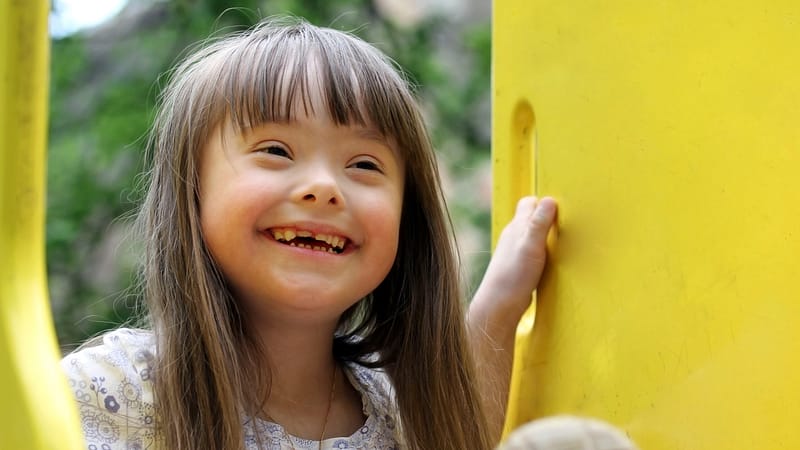The month of March is recognised internationally as Trisomy Awareness Month (‘tri’ meaning three and March being the third month of the calendar year).
Trisomy is a genetic condition whereby a person has a third copy of a chromosome.
Typically, a person only has 23 pairs of chromosomes (46 in total), however, when someone has a trisomy, they have an extra chromosome. The most commonly known trisomy is Down syndrome which has an extra chromosome 21.
How a person is affected by this extra chromosome is unique to that individual.
Essentially, you can have 2 people with the same ‘diagnosis’ e.g. Down syndrome, however, how each of them is affected by their condition, is a very individual experience. Some people can be mildly affected, while others, unfortunately, have many medical complications.
There are other trisomy conditions such as Patau Syndrome (Trisomy 13) and Edwards Syndrome (Trisomy 18). These trisomies, although being some of the more common, often don’t get as much attention as Down syndrome, because they occur less frequently and are often more severe, so the survival rate is lower.
Our own General Manager, Brad Mumford, became aware first-hand of the family impacts and challenges associated with trisomy, when their 10-month-old daughter Madelyn was born with Edward’s Syndrome.
“We knew when Maddie was born that she was going to be our little trouble maker, though we had no idea how much our world would be turned upside down when we received news of her diagnosis,” says Brad.
The statistics are particularly grim for children born with Edward’s Syndrome. However, with new medical research and science being actioned in the United States to assist each new baby born with a trisomy condition, those statistics are improving.
“From that point of diagnosis to today, it has been a confusing, and yet hopeful, journey as Madelyn has presented with no visible symptoms, or health conditions directly related to Trisomy 18,” says Brad.
“She is growing up with all the confidence and ability that you would expect to see in any baby.”
“If it wasn’t for the fact that we have a medical diagnosis, and that we have been open in sharing our story with others, nobody would have ever known anything different,” he says.
Brad and his wife have spent much time researching the condition, and seeking medical opinion.
What they have learnt has reinforced that the presence of a trisomy is not necessarily a predictor of later health outcomes; that it is an entirely individual experience.
“We’ve since discovered that Madelyn has an extremely rare case of [partial unbalanced translocated mosaic] Trisomy 18,” says Brad.
In rarer cases, a person can have a mosaic trisomy condition, where a third copy of a chromosome is present, but NOT in every cell of the body. How this impacts a child or person, whether they are severely or mildly affected, is again an entirely individual experience.
“This is a clear indicator that just because someone has been diagnosed with a genetic condition, they are still their own person as there are many different ways an extra chromosome can express itself,” says Brad.
“For this reason, we see that there is always hope of a better outcome for Madelyn, and for many other people and families living a Trisomy Life” he says.

Lack of Information
One thing that Brad and his wife Nicky struggled with initially was a lack of information on the condition, and a feeling of being alone.
“Through supporting Madelyn, we have become acutely aware of the strain placed on parents when told that there is little that they can do for your child – how this translates to a lack of available support, both medically and in the community,” says Brad.
“Fortunately, we discovered a community of families that we could connect with through becoming part of the SOFT Australia network,” he says.
“And, that has helped to provide us with some of the support that we sorely needed.”
SOFT Australia
SOFT Australia (Support Organisation for Trisomy in Australia) is a registered non-profit, volunteer organisation that is dedicated to the development of a network to support and educate those affected by a Trisomy condition and other related chromosomal disorders, including parents, family, friends and health professionals.
SOFT Australia is part of a global community, along with SOFT USA and SOFT UK, that seeks to foster networks within Australia, and around the World.
“By raising awareness of the word Trisomy, we hope to ‘demystify’ the condition and help people understand it, “says Tracey Pass, who founded SOFT Australia in 1996.
One of the fundamental aims of the organisation is to connect people with others who are experiencing many of the same issues relating to Trisomy conditions.
“Most of what we do is connect families, answer emails and phone calls and help people to process what they have been told by the medical professionals,” says Tracey.
“Through social media, we also provide the opportunity for people to share stories of their own children and journey with trisomy.”
SOFT Australia also runs a conference every second year that aims to connect families across Australia.
“This is a time for families to get away from routine, have some fun, learn some new things and meet other families in the same situation,” she says.
In addition, the organisations holds a memorial event each year to remember those affected by Trisomy who have passed away.
“This is a precious time for families and friends to reflect and remember their loved one,” says Tracey.

Further Information
#TrisomyAwarenessMonth
http://www.trisomyaustralia.com
http://www.trisomyonline.org/





